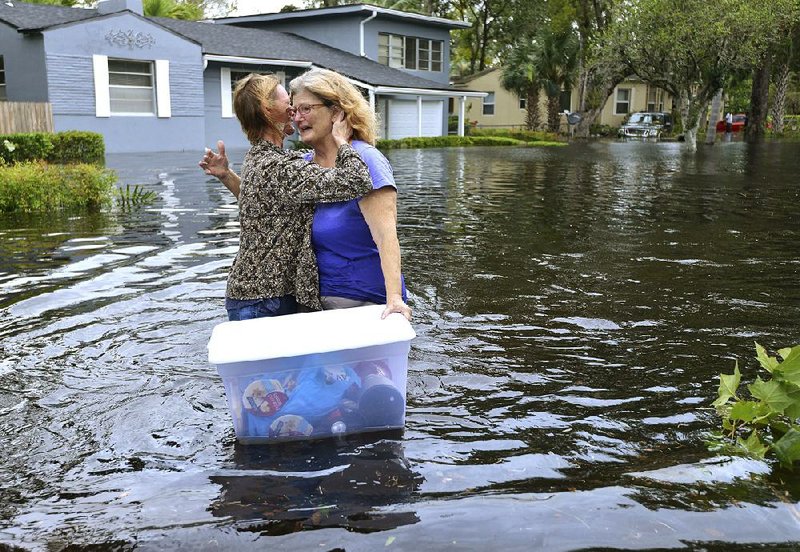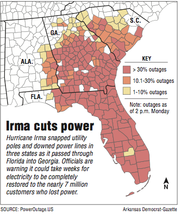MIAMI -- The remnants of Hurricane Irma swept north through Florida on Monday, leaving behind a trail of debris, flooding and power failures after the storm roared up the full length of the state and brought drenching rainfall and battering winds to Georgia.
Irma weakened Monday to a tropical storm and then a tropical depression, losing some of its punch but still packing powerful winds that stretched from central Florida to North Carolina.
As the storm finally left Florida on Monday, the full scale of its destruction was still unknown, in part because communications were cut off and roads blocked.
Six deaths in Florida have been blamed on Irma, along with three in Georgia and one in South Carolina. At least 35 people were killed in the Caribbean as the storm closed in on the U.S. mainland.
Click here for larger versions
Photos by The Associated Press
Photos by The Associated Press
In Florida, an estimated 13 million people, or two-thirds of Florida's population, remained without power, and officials warned it could take weeks for electricity to be restored to everyone.
"We've never had that many outages. I don't think any utility in the country has," Eric Silagy, president and chief executive of Florida Power and Light, the state's largest utility, said at a news briefing Monday.
Because of the storm's size, crews were not able to start restoration efforts until late Sunday night, he said, and they are still not able to move across northern Florida. He also said debris is strewn throughout the state.
During its march up Florida's west coast, Irma swamped homes, uprooted trees, flooded streets, snapped miles of power lines and toppled construction cranes.
[HURRICANE TRACKER: Follow Irma’s projected path]
In a parting shot, it triggered severe flooding around Jacksonville in the state's northeast corner. It also spread misery into Georgia and South Carolina as it moved inland with winds at 50 mph, causing flooding and power failures.
As of 10 p.m. Monday, Irma was about 5 miles south of Columbus, Ga., with maximum sustained winds of 35 mph. It was heading northwest at 15 mph.
Authorities sent an aircraft carrier and other Navy ships to help with search-and-rescue operations in Florida as a flyover of the battered Keys yielded what the governor said were scenes of devastation.
"I just hope everyone survived," Gov. Rick Scott said.
He said boats were cast ashore; water, sewers and electricity were knocked out; and "I don't think I saw one trailer park where almost everything wasn't overturned." Authorities also struggled to clear the single highway connecting the string of islands to the mainland.
The Keys felt Irma's full fury when the storm blew ashore as a Category 4 hurricane Sunday morning with 130 mph winds. Officials estimated that about 25 percent of Key West's residents stayed through the storm despite evacuation orders.
"It's horrible, what we saw," Scott said. "I know for our entire state, especially the Keys, it's going to be a long road."
In the Jacksonville area, near the Georgia line, storm surge caused some of the worst flooding ever seen there, with at least 46 people pulled from swamped homes.
The Jacksonville sheriff's office warned residents along the St. Johns River to "Get out NOW."
"If you need to get out, put a white flag in front of your house. A t-shirt, anything white," the office said on its Facebook page. "Search and rescue teams are ready to deploy."
Jacksonville was facing a "trifecta" of water-related threats, city officials said: storm surge, heavy rainfall over the weekend and Monday's rising tides. "This is potentially a weeklong event with water and the tides coming and going," Mayor Lenny Curry said.
GEORGIA, S.C. WOES
A tornado spun off by Irma was reported on the Georgia coast, and firefighters inland had to rescue several people after trees fell on their homes.
Nearly 1.5 million customers were without power in Georgia, over 80,000 in South Carolina, and over 45,000 in Alabama.
Communities along Georgia's coast were swamped by storm surge and rainfall arriving at high tide Monday afternoon.
Tybee Island City Manager Shawn Gillen said waters were receding quickly, but many of the 3,000 residents' homes were flooded.
"I don't think people who have lived here a long time have ever seen flooding this bad," Gillen said.
Some of the worst flooding occurred in Charleston, S.C., where knee-high floodwaters coursed through the streets. In an interview Monday afternoon, Mayor John Tecklenburg said the city had been hit with a four-foot storm surge, leaving parts of the peninsula looking as if they had merged with the Ashley River.
Over the next two days, Irma is expected to push northwest into Alabama, Mississippi and Tennessee.
It is expected to keep losing force as it continues inland, and forecasters say it should be a tropical depression by this afternoon.
In Atlanta, Delta Air Lines canceled about 800 flights from its hub operations Monday in anticipation of "strong crosswinds," which could reverberate through the air travel system nationwide. Thousands of flights have already been halted.
CARIBBEAN TOLL
In the Caribbean, the historic but often decrepit buildings of Havana and other colonial cities couldn't stand up to Hurricane Irma's winds and rainfall, collapsing and killing seven people in one of the highest death tolls from the storm's passage through the Caribbean.
Authorities said Monday that three more people were killed by falling objects or drowning. It was Cuba's worst hurricane death toll since 16 died in Hurricane Dennis in 2005.
Two women on a Havana bus were killed when a fourth-floor balcony tumbled on to the vehicle.
Besides the two women, both 27 years old, a 71-year-old man died in Havana when he touched a live electric cable as he was trying to take down an antenna, and a 77-year-old resident of Old Havana was killed as he crossed a street and was hit by an electric pole dislodged by the wind.
Five people were killed when their homes collapsed, and an 89-year-old woman was found floating in the water in front of her home, according to Cuba's Civil Defense Council. Two brothers were killed after the partial collapse of a Havana dwelling and the three men who died in their homes in Matanzas, Ciego de Avila and Camaguey provinces did not observe evacuation orders, Cuban authorities said.
Damage wasn't limited to Havana. More than 100 houses in a small town on Cuba's coastline were destroyed in Matanzas Province when Irma swept through the area, leaving hundreds of people homeless.
Authorities in Haiti on Monday confirmed the first death from the country's brush with Irma.
To the east, in the Leeward Islands residents have reported food, water and medicine shortages, as well as looting.
British Foreign Secretary Boris Johnson defended his government's response to what he called an "unprecedented catastrophe" and promised to increase funding for the relief effort. Britain sent a navy ship and nearly 500 troops to the British Virgin Islands, Anguilla and the Turks and Caicos islands that were pummeled by the hurricane.
Dutch King Willem-Alexander flew to Sint Maarten, which shares the island with the French dependency of St. Martin, to see the devastation wreaked by Irma and express gratitude to relief workers. Dutch news outlets showed the king touring the badly damaged Princess Juliana International Airport, which was named for his grandmother.
French President Emmanuel Macron was scheduled to arrive today in St. Martin to bring aid.
In the U.S. Virgin Islands, residents of the capital, Charlotte Amalie, reported long lines for dwindling supplies of basics such as water, food and gasoline.
"You get nothing from the city. Nothing. No food. No water. Everything is closed," said Rene Concepcion, who waited for up to three hours to get water.
TAMPA LUCKS OUT
People in the heavily populated Tampa-St. Petersburg area had braced for the first direct hit from a major hurricane since 1921. But by the time Irma arrived in the middle of the night Monday, its winds were down to 100 mph or less.
The governor said damage on the southwest coast, including in Naples and Fort Myers, was not as bad as feared.
"When that sun came out this morning and the damage was minimal, it became a good day," said Tampa Mayor Bob Buckhorn.
The residents of the Royal Duke Trailer Court in the Allapattah neighborhood of Miami were just happy to see their homes still standing Monday. Many of them evacuated thinking their mobile homes would be no match for Irma, and they were surprised to see the storm weaken just enough to spare their homes. So the mood at the park on Monday was almost festive.
Neighbors were out, laughing and helping one another clean up the tree debris. Their power was still out Monday, so none wanted to be inside.
Kat Suarez's family home took a large tree trunk to its roof. The roof of the two-bedroom house was damaged, but the tree didn't puncture the home's ceiling.
"We didn't think this was going to make it," said Suarez, whose family has lived in the home since before she was born. "It's bad, but it wasn't as bad as we thought. I didn't think it was going to be here when we got back."
RELATED ARTICLES
http://www.arkansas…">French islanders see evacuee biashttp://www.arkansas…">Guardsmen file back from Texas
http://www.arkansas…">TV reporters ignore own advice to put storms' fury on air
http://www.arkansas…">For oil, bigger ill Harvey, not Irma
Information for this article was contributed by Jennifer Kay, Doug Ferguson, Seth Borenstein, Terry Spencer, Gary Fineout, Jay Reeves, Terrance Harris, Claire Galofaro, Jason Dearen, Freida Frisaro, Curt Anderson, David Fischer, Jonathan Landrum Jr., Russ Bynum, Andrea Rodriguez and Desmond Boylan of The Associated Press; by Perry Stein, Mark Berman, Katie Zezima, Patricia Sullivan, Joel Achenbach, Scott Unger, Darryl Fears, Lori Rozsa, Brian Murphy, David Fahrenthold, Jason Samenow, Angela Fritz, Amanda McLaren and Katie Mettler of The Washington Post; by Mimi Whitefield and Nora Gamez Torres of the Miami Herald; and by staff members of the New York Times.
A Section on 09/12/2017


